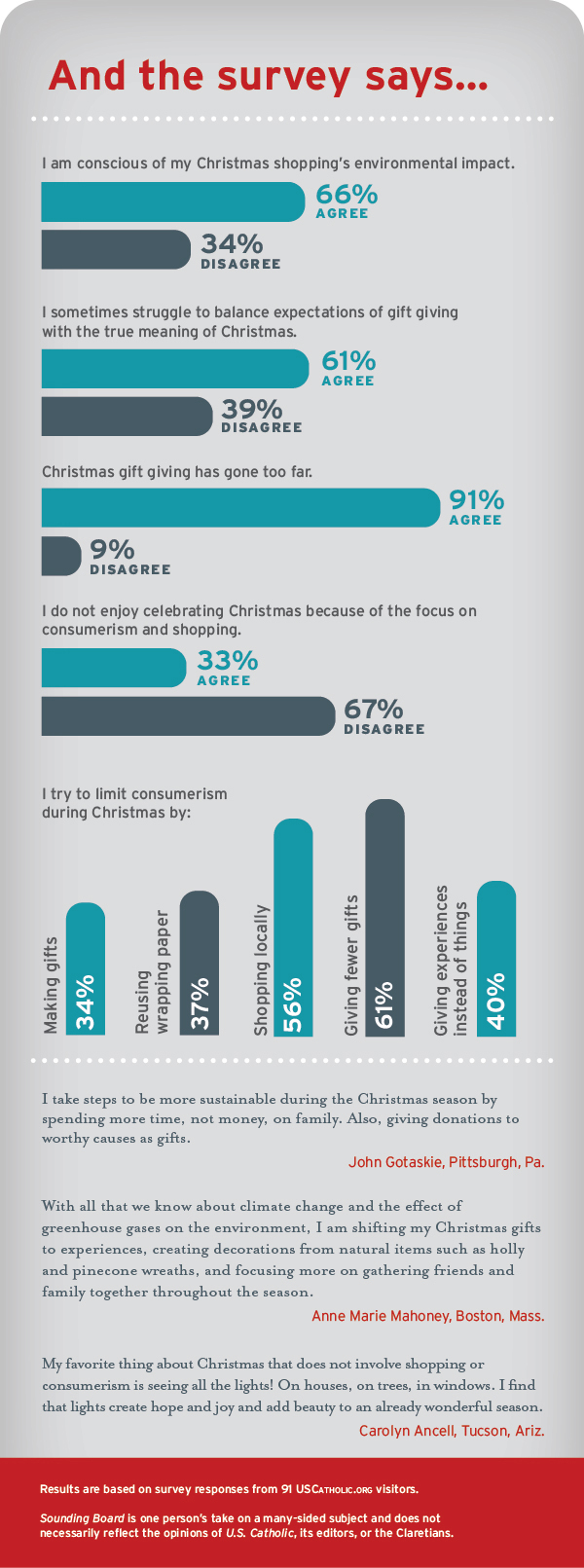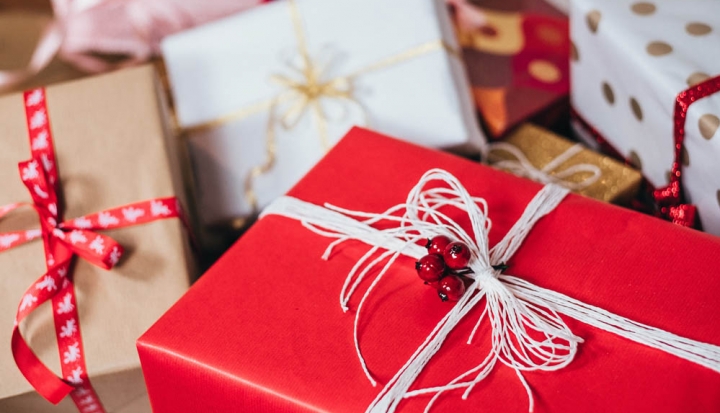Blank calendar squares that suggest a relaxing autumn disappear when the November page is pulled. In December we go from flurries to a full-blown snowstorm of activities that fall fast upon our household in blizzard-like heaps. The short days leading up to Christmas are jam-packed, but even when they leave me exhausted I love them. Every festivity and finishing touch makes the season special, even more so now with kids to share in our nostalgia.
What I don’t love are the piles of junk left behind and the snowdrifts of guilt blown right through the joy. Where did all of this stuff come from? Where will all of this trash go? And was any of it really necessary or appropriate during this sacred season?
Christmas consumerism and its environmental impact have become a tightrope we walk, especially with young kids, and this year I am scared to look down. We are pushing our planet to its limits for the sake of a few fun parties, and I can’t say that it is OK any more.
Catholic social teaching calls on us to care for the environment. The seventh teaching, care for creation, reminds us that God’s love is reflected in all creation, and therefore we need to be committed to love, respect, and actively care for this creation. How we celebrate Christmas does not always uphold this teaching, and it’s up to us to truly answer this call.
I have long struggled to balance my Christmas shopping list with the true meaning of the season and sought ways to give and package gifts responsibly while keeping our planet’s well-being in mind. I have not always succeeded. Our home is filled with plastic toys and tiny trinkets my kids will not soon part with, and although I have several rolls of holiday wrapping paper in my attic, I always find myself buying more when I see a good deal or a pretty pattern.
I am not ready to call it quits on Christmas gifts completely, but this year I am ready to scale back, make better choices, and model a healthier attitude toward Christmas consumption. I want this for the sake of the Earth and all of its inhabitants, especially our children who will inherit the obligation of its care.
The year 2019 marked a notably difficult year for the environment. Record-setting heat waves and forest fires raging through the Amazon should give everyone pause. Climate change is real and caused by humans. Where will Santa Claus live when the North Pole melts away?
Yet we want more, we expect more, we buy more, we wrap it all up and give it away as well-intentioned gifts. And then one day it ends up in the trash.
According to Conservation International, we are dumping almost 18 billion pounds of plastic into the oceans every year. There are islands of trash twice the size of Texas floating around out there. I think it is time to sit down and have a little heart-to-heart with ourselves, with one another, and with Santa and consider some alternatives to our current gift-giving traditions.
There are so many ways we can give gifts ethically and celebrate Christmas in a fun, loving way without getting caught in the consumerism trap and without contributing so much to our carbon footprint.
Our kids have come to expect Santa to swing through in the fall to collect dormant or outgrown toys. They also expect some of their gifts to be gently used or repurposed. Elves are great at fixing things and making them new again.
Christmas morning is super fun but also practical. Stockings are stuffed with . . . more stockings, of course, and other necessities such as underwear or a toothbrush. We give books and experiences and homemade cards. There are toys but not in excess, and we try to be conscious of environmentally friendly brands and those with sustainable product material and packaging.

Shopping holidays, endless storewide sales, and the ease of Amazon.com are difficult to give up—don’t get me wrong! One way to feel better about your choices is to buy local.
Consider skipping the Black Friday sales and waiting for Small Business Saturday. Small businesses are vital to our local economies and especially our communities. Our neighbors work there and benefit when we shop from them. They can offer unique products not available at big box stores or the typical mall chains, plus they can do so without high levels of waste involved.
Handmade and vintage gifts are also great to consider at Christmas, whether made by you or found somewhere like Etsy.com. These gifts are less likely to wind up in the garbage as something mass-produced or poorly crafted.
Another idea is to give gifts that encourage others to care for the environment. I have given reusable grocery bags, houseplants, and eco-friendly beauty products that are always a hit. Homemade meals or a community-supported agriculture membership are great for foodie friends. Compost kits, a beekeeping class, a bus ticket, or a new bike can all help reduce carbon emissions in a thoughtful way.
However you give, think in terms of “Reduce, Reuse, Recycle” and get creative—the possibilities are endless! And if you have nothing else, remember the little drummer boy. He had no gift to bring before the baby Jesus, but he came anyway, playing his drum as best he could, offering his talents before the Lord. That is the best kind of gift we can give sometimes.
Think about your food choices during the holiday season and the implications they may have on the environment. Just as shopping locally can help, so can eating locally. Local meat and produce may seem more expensive today but by reducing food miles, environmental impacts are drastically reduced as well.
It’s understandable to feel like our changes won’t matter in the long run, but through self-reflection and education we can forge a better path for future generations.
By modeling good judgment regarding our purchases we can teach our children to respect the Earth as well as their belongings. The ball is rolling; let’s be the generation that keeps it moving instead of the one that buries it under a pile of plastic. The rewards of substituting our holiday habits can still create priceless memories worthy of Christmas nostalgia to be passed down to future generations without the ecological burden.
Consumerism and greed can easily walk hand in hand, but I won’t say this is always true, especially at Christmastime. Yet we have become desensitized to a throwaway culture. Many of us are influenced by intense holiday marketing campaigns and have come to expect too much of ourselves (or perceive that others expect much of us). These misinterpretations have become a wintery mix, blurring what began as a generous spirit and leading to dangerous conditions for our souls, our descendants, and our planet.
I won’t judge your decisions, but I will urge you to make good choices for the most precious gifts God entrusted to us: our children and our Mother Earth.
This article also appears in the December 2019 issue of U.S. Catholic (Vol. 84, No. 12, pages 33–37). Click here to subscribe to the magazine.
Image: Unsplash cc via Freestocks
















Add comment